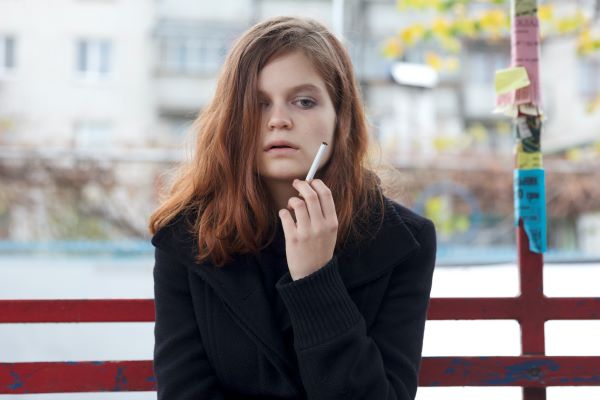Ukraine’s 2021 Oscar nominee for best international film, this fierce drama follows in the footsteps of other recent Ukrainian films, most notably Sergei Loznitsa’s masterful Donbass (2018), examining the effect of war on those living in the Donbass region. The plot consists of four tangentially related segments in which a recurring theme is power dynamics between soldiers and civilians, youth and elder, captor and captive, and more. Twists and turns abound with the most satisfying moments being those in which relationships and expectations of who has power get turned onto their heads.
The first chapter, set at a military checkpoint, involves a soldier (Vladimir Gurin) and his commanding officer (Andrey Lelyukh) who have an intense encounter with a driver (Igor Koltovsky) who is carrying the wrong identification and appears intoxicated. The officials are increasingly agitated by the man’s confused, at-times contradictory statements, while he becomes more and more annoyed at being detained. Director Natalya Vorozhbit’s slow-burn approach benefits the scene as the interrogation becomes increasingly surreal—we can never be completely sure of what to make of the driver. As a result, the soldiers repeatedly alternate between potential abusers of their authority and potential targets of violence themselves.
The second segment centers on a trio of high school delinquent girls who pass the time hanging out near a convenience store in an urban area, smoking and keeping a lookout for soldiers with whom they are involved (possibly in exchange for money). Gradually, one (Anna Zhurakovskaya) is left alone until her grandmother (Yulia Matrosova) shows up for a heart-to-heart conversation. If the previous segment focused on how a defensive mindset affects those at the front line, this time we see how it afflicts civilians located away from the fighting. The grandmother only wants to take shelter, pray, and mourn, leaving her granddaughter as the one responsible for keeping them both safe.
The film’s longest and most harrowing section concerns a journalist (Maryna Klimova) held captive by a rage-filled militant (Yuri Kulinich) in an abandoned sanitorium. There he repeatedly beats, berates, degrades, and attempts to rape her while she, in turn, constantly appeals to his humanity despite being obviously afraid. Both actors do powerful work amid a claustrophobic, decrepit backdrop. Kulinich, in particular, is an absolutely terrifying embodiment of the pro-Russia fighter, practically frothing at the mouth about the conspiratorial inclinations of the West and how many enemy combatants he’s murdered to date.
In the fourth and arguably strongest story, an upper-class young woman (Zoya Baranovskaya) accidentally kills a chicken with her car and then tries to compensate the owners for it. The prior chapter made reference to a similar situation via anecdote (this is the kind of tangential thread connecting the segments), which leads us to believe we know how this story will end. Not so, as the old couple (Oksana Voronina, Sergei Solovyov) manage to talk the penitent woman into their home after dark, at which point they have all the leverage to extract their dead hen’s worth—and then some.
Vorozhbit conducts the pivotal confrontation between the three in what feels like real time, allowing us to see the chicken-owners’ transformation into predators as it happens gradually and organically. Ultimately, Vorozhbit may not be quite as ruthless—or hopeless—as a filmmaker like Loznitsa when it comes to depicting people giving in to their base instinct of self-preservation. Indeed, she leaves open the possibility that people are still capable of moments of clarity, when they see the abyss looming beneath them and can still turn around before it’s too late. That makes Bad Roads of a piece with films like Donbass, yet compelling in its own right.

















Leave A Comment